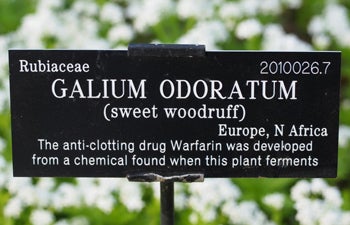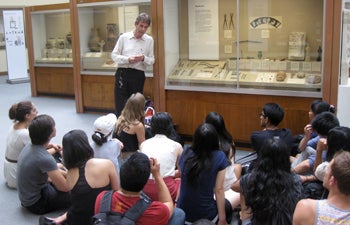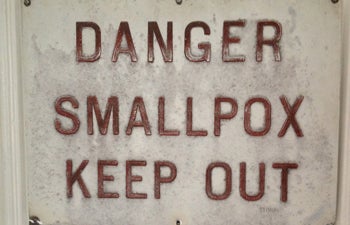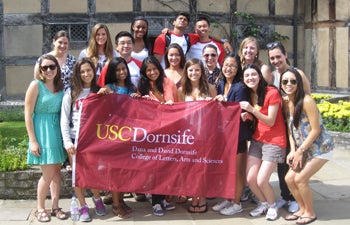Planting Thoughts on Global Health
Strolling among the lavender, bell-like beardtongues and enchanting weeping willows, Erin Walker got more than eye candy at one of the world’s oldest scientific gardens.
During her visit to the University of Oxford Botanic Garden in England, the USC Dornsife undergraduate learned that willow bark extract could be used to treat headaches. Its chemical makeup contains the same active ingredient used in aspirin.
Found in the plant Artemisia annua — known as sweet wormwood — artemisinin also has curative properties, she learned. In combination with other drugs, it can be used to treat malaria, a disease widespread in tropical regions of Sub-Saharan Africa and Asia.
The outdoor lecture provided Walker and her classmates a window into alternative treatments for diseases. And more importantly, it broadened their understanding of modern medicine.
“It was really interesting to see the similarities between plants and herbs and the drugs we use,” said Walker, a senior neuroscience and human biology major. “I didn’t realize that many of the drugs used today in Western medicine are actually derived from plants.”

Every plant is labeled at the University of Oxford Botanic Garden. During their visit, USC undergraduates learned about the medicinal purposes of plants. Photo courtesy of Oxford Botanic Garden.
Walker was among 23 USC students who spent four weeks at St. Catherine’s College in Oxford, England, this summer for the course “Biology of Tropical Diseases” as part of the Problems Without Passports program (PWP), housed at USC Dornsife. This is the third summer USC students have traveled to Oxford for the course.
Gaining a broader perspective on global health is what the class is all about, said Erin Quinn, emeritus associate dean of admissions and educational affairs at the Keck School of Medicine of USC. Quinn is the faculty member associated with the course and Judy Haw, director of supplemental instruction at USC Dornsife, was coordinator. Both accompanied the students to Oxford.
“In the course, they learn a holistic approach to medicine, which is important in remote or under-resourced communities,” Quinn said. “The course takes into account what challenges exist, the systems of healthcare in place and what treatments are available.”
During the trip, students explored global health, health policy and public health, tropical medicine, vaccinology, and international development and health. Daily lectures covered topics such as malaria, HIV/AIDS, herbal medicine and snake bites — the latter posing a huge public health hazard in many countries. They also studied non-communicable diseases, which present great challenges to worldwide health. Diabetes, obesity and cardiovascular disease were among the diseases analyzed.
Experts in global medicine at the University of Oxford gave the lectures. Merlin Willcox, a professor and primary care physician, spoke on herbal medicine. He helps implement cost effective ways to save lives in low-income African communities. He also runs a health center for the homeless in Oxford.

At the British Museum in London, students learn about Roman and Greek medical artifacts from Ralph Jackson, the museum’s Romano-British Collection curator. Ancient surgical tools and terracotta models of body parts are featured in the cases. Photo by Judy Haw.
Terence Ryan, a dermatologist with more than 50 years’ experience, taught students about low-cost, integrated therapies he uses in India to treat people with elephantiasis. Other professors had treated tropical diseases in Tanzania, Cambodia and Papua New Guinea.
“We not only learned about the specifics of the science of a vaccination, but speakers taught us about healthcare economics and the different systems of healthcare around the world,” said Moriah Mulroe, an environmental science and engineering sophomore. “We really got a broad view of all healthcare factors.”
Students also visited the Museum of the History of Science and the British Museum, where Romano-British Collection curator Ralph Jackson discussed the museum’s collection of Roman and Greek medical artifacts such as ancient surgical tools and terracotta models of body parts. They also toured the Edward Jenner Museum. Known as the “father of immunology,” Jenner pioneered the smallpox vaccination. His home now houses exhibits on the history of immunology.

Students toured the Edward Jenner Museum in Oxford. Jenner pioneered the smallpox vaccination. His home now houses exhibits on the history of immunology. A door bears this warning with a note saying, “Signs like this were once a familiar site near isolation hospitals. You are quite safe. There is no smallpox here. The room houses the museum research collections.” Photo by Jazmine Mayfield.
“Touring museums was a great part of this program,” Walker said. “It gave us a good sense of the history of medicine.”
Students teamed up to write research papers on a global health topic and then presented their findings to their peers.
“The idea is for them to look into, and understand in-depth, one issue in tropical medicine and figure out how they would address the medical and social issues,” Quinn said. “What’s interesting is to see the change that occurs from their initial approach about potential solutions before they go to Oxford, and then their perspective to approaching the problem once they’ve attended the lectures.”
Mulroe and Jazmine Mayfield, a senior neuroscience major, wrote their research paper on natural disaster response. The two investigated the preparation and response to the 2010 earthquake in Haiti, the 2011 earthquake and tsunami in Japan and 2005’s Hurricane Katrina in New Orleans, La.
They learned that health workers should understand their patients from a cultural as well as medical perspective. For instance, after the Haiti quake, medical crews posted signs warning against drinking the river water, which had become contaminated. However, a high percentage of the population could not read. A devastating outbreak of cholera followed.

During the summer course “The Biology of Tropical Diseases,” part of the Problems Without Passports program, USC students gather at William Shakespeare’s birthplace in Stratford-upon-Avon, England. Photo by Judy Haw.
Mayfield, who intends to become a pediatrician, believes in the importance of understanding one’s community.
“We live in a diverse country,” Mayfield said. “It’s really important to realize that people are coming from different backgrounds and that we need to see things from their perspective. We have to understand where people from all backgrounds are coming from to help them effectively.”
Walker, an aspiring dentist, said the trip motivated her to devote her career to all walks of life.
“The course inspired me to dedicate a portion of my future practice to serving patients without access to dental care or health insurance,” she said.
Read more about students’ experiences in the course on their class blog.